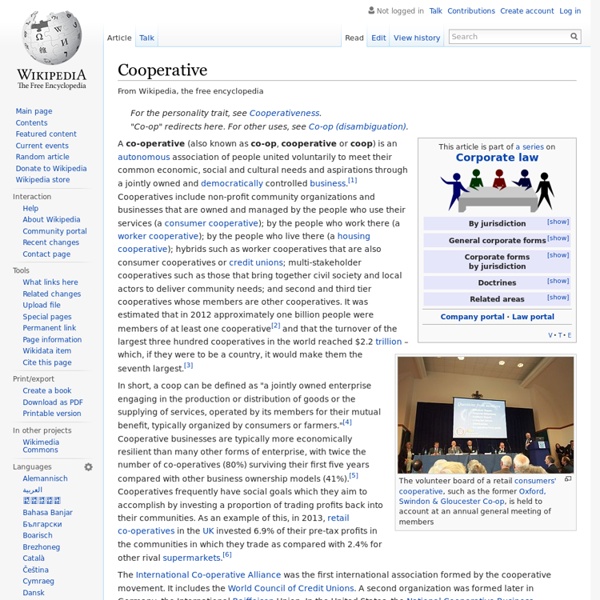Self-organization
Self-organization occurs in a variety of physical, chemical, biological, robotic, social and cognitive systems. Common examples include crystallization, the emergence of convection patterns in a liquid heated from below, chemical oscillators, swarming in groups of animals, and the way neural networks learn to recognize complex patterns. Overview[edit] The most robust and unambiguous examples[1] of self-organizing systems are from the physics of non-equilibrium processes.
Distributism - Wikipedia
Doctrine in opposition to both socialism and capitalism Distributism is an economic theory asserting that the world's productive assets should be widely owned rather than concentrated.[1] It was developed in Europe in the late 19th and early 20th centuries based upon the principles of Catholic social teaching, especially the teachings of Pope Leo XIII in his encyclical Rerum novarum (1891) and Pope Pius XI in Quadragesimo anno (1931).[2][3][4] It views both capitalism and socialism as equally flawed and exploitative, and it favors economic mechanisms such as small-scale cooperatives and family businesses, and large-scale antitrust regulations. Some Christian Democratic political parties have advocated distributism in their economic policies. Overview[edit]
Five Manifestos for the Creative Life
by Kirstin Butler How a numbered list can start a personal revolution. Some days everyone needs a little extra encouragement. The words or lines or colors don’t want to come, or worse, we don’t even want to sit down to create.
Horizontalidad - Wikipedia
Horizontality or horizontalism is a social relationship that advocates the creation, development, and maintenance of social structures for the equitable distribution of management power. These structures and relationships function as a result of dynamic self-management, involving the continuity of participation and exchange between individuals to achieve the larger desired outcomes of the collective whole. Origin[edit] As a specific term, horizontalidad is attributed to the radical movements that sprouted in December 2001, in Argentina, after the economic crisis.
Worker cooperative
A worker cooperative is a cooperative owned and self-managed by its workers. This control may be exercised in a number of ways. A cooperative enterprise may mean a firm where every worker-owner participates in decision making in a democratic fashion, or it may refer to one in which managers and administration is elected by every worker-owner, and finally it can refer to a situation in which managers are considered, and treated as, workers of the firm. In traditional forms of worker cooperative, all shares are held by the workforce with no outside or consumer owners, and each member has one voting share.
101 Timeless Lessons Life Teaches
post written by: Angel Chernoff Email Take everything you’ve ever learned – all the crazy experiences and lessons – and place it all in a box labeled “Thank you.” What has life taught you?
Mondragon Corporation
Mondragon cooperatives operate in accordance with Statement on the Co-operative Identity maintained by the International Co-operative Alliance. History[edit] The determining factor in the creation of the Mondragon system was the arrival in 1941 of a young Catholic priest José María Arizmendiarrieta in Mondragón, a town with a population of 7,000 that had not yet recovered from the Spanish Civil War: poverty, hunger, exile and tension.[2] In 1943, Arizmendiarrieta established a technical college that became a training ground for generations of managers, engineers and skilled labour for local companies, and primarily for the co-operatives.[3]
Critical Thinking Worksite: Introduction
I. Just What is Critical Thinking? When you hear "critical thinking", it is natural to think of criticism---that is, of unpleasant episodes involving your parents or your boss. One can think critically in episodes like these, but the term applies to many others as well. Critical thinking is evaluative thinking---it involves evaluating options for the purpose of reaching conclusions about those options. Alongside writing and speaking, it is one of the most important intellectual skills you possess.



